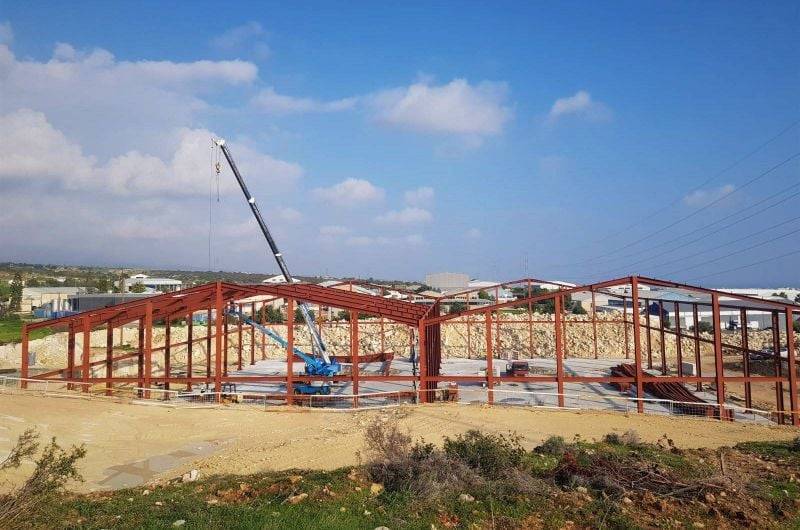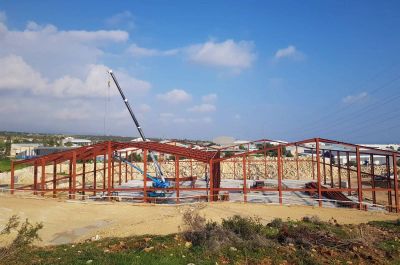
The factory in Ypsonas, in the district of Limassol, should be operational "from the end of the third quarter of 2023," Nayef Kassatly says. (Credit: DR)
Despite a business environment made increasingly difficult by the country’s ongoing financial crisis, Lebanon can still count on a pool of local industrialists who are managing to find opportunities abroad. This is notably the case of the Kassatly Chtaura group, one of the largest producers of alcoholic and non-alcoholic beverages in Lebanon, which is preparing to produce and market some of its products from Cyprus, more specifically Freez, its fruit-flavored carbonated drink.
It is a strategic decision that “has nothing to do with the situation in Lebanon,” said Nayef Kassatly, the group’s CEO, specifying that the group is not relocating its production to the island, but is deploying additional production lines there. “We are not moving to Cyprus, we are expanding our business there, which in any case we must do,” he told L’Orient-Le Jour.
Indeed, given the international success of its soft drink, Freez, the group says it had to reduce the production of other drinks in its portfolio and limit the development of other products to meet demand. Setting up a factory in Cyprus is therefore an opportunity for the group to kill two birds with one stone, namely to increase production capacity and establish itself in Europe.
One foot in Europe
“Being present in Europe has become a priority for us,” said Nayef Kassatly, “because it allows the group to market under the label ‘Made in Europe,’” a door opener that will strengthen the reputation of the brand abroad and allow it to export more easily around the world.
While Kassatly Chtaura aims through this approach to open up to European countries and the United States, the group is still keeping an eye on the Gulf markets. “Producing and marketing from Europe will also enable us to resume part of our exports to Saudi Arabia,” says the general manager, thus solving a problem that dates back more than a year.
In early November 2021, Saudi Arabia decided to impose an embargo on Lebanese exports. This decision was motivated by the Saudis’ desire to deal with the growing influence of Hezbollah in Lebanon and to combat the smuggling of captagon (which originated in, or transited through, Lebanon). Since then, Lebanese companies have lost what was for them the third most important export destination in 2020 — a year during which they sold nearly $230 million, or 5.6 percent of all Lebanese exports, to Saudi Arabia — after Switzerland and the United Arab Emirates.
The Cypriot neighbor
Located in Europe and offering all the above-mentioned advantages, Cyprus is only a 30-minute flight away and therefore appealing to the Lebanese group.
“Although tax incentives in Cyprus are attractive, it is mainly the geographical advantages” of the island that have pushed Kassatly Chtaura to establish itself there, Akram Kassatly, founder and president of the group, said in a statement.
In addition to its proximity to European markets, African and Gulf countries, the island is, above all, close to Lebanon, added his son, Nayef.
The project was made possible with the help of Invest Cyprus, the government agency for the promotion of investments in Cyprus, whose mission is to attract and facilitate foreign direct investments in the country.
The factory, the construction of which was launched “nearly four months ago” in Ypsonas — in Limassol — should start operating “from the end of the third quarter of 2023,” Nayef Kassatly said.
Registered under the name Boutique Beverage Bottling International (BBBI), it will employ about 100 people, half of whom will be Lebanese, says the general manager.
Located in Chtaura, in the Bekaa Valley, the group’s only plant in Lebanon has nearly 400 employees today, some of whom, mainly managers, could be transferred or encouraged to make the short trip.
Wishing not to comment on production volumes or on the amount and terms of the investment, Nayef Kassatly said however that “this new plant will have the same capacity as the one in Lebanon, which will allow us to double our production.”
Launched in 1974, Kassatly Chtaura currently produces soft drinks, liqueurs, syrups, wine, alcoholic and non-alcoholic beers, juices and jams in Lebanon. But as far as the Cyprus plant is concerned, the company plans to focus initially on its soft drinks range. It then plans to start the development, production and marketing of new products, manufactured according to the target markets.
“We are banking on this expansion to strengthen our position in Lebanon and to remain anchored here,” said Nayef Kassatly. “We have no intention of leaving the country. In fact, we have just made an investment in our factory in Chtaura, including the installation of a 1.2 megawatt photovoltaic panel system.”
Having one foot in Lebanon and another in Cyprus would allow the group to reduce its exposure to the risk that Lebanon represents, while giving some of its employees, many of whom are willing to leave the country due to deteriorating living conditions since the outbreak of the economic crisis, the chance to move to Cyprus.
This article was originally published in French in L'Orient-Le Jour. Translation by Joelle El Khoury.
